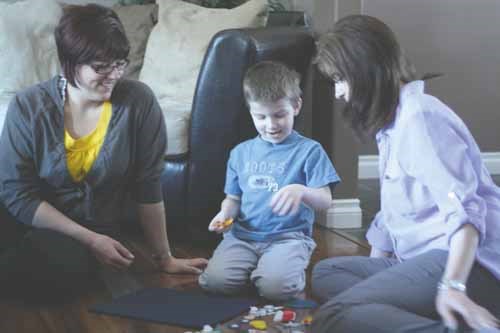Brady McNeil loves space.
He knows there are eight planets in the solar system, their names and relative positions. He knows that Saturn is not the only one with rings; in fact, all the gas giants have them. He rattles off their names in rapid succession. He knows Pluto is now considered a dwarf planet, that there are many other dwarf planets and he can name the five main ones. And he is working on the names of Jupiter's moons-all 63 of them.
Brady is four years old.
At approximately 18 months, Kelly McNeil, Brady's mom, said they noticed he was not developing gross and fine motor skills or language as quickly as other kids his age. He was diagnosed with autism and referred to the Parkland Early Childhood Intervention Program (PECIP).
The PECIP assists Yorkton and area families with children experiencing developmental delays-not just autism-with help on navigating the health and education systems to get the resources and programs they need.
Crystal Hawcutt, one of the interventionists with the program was assigned to Brady after the McNeils were referred to the program. She helps the family with one-on-one instruction and techniques to focus Brady's development, including incorporating his interests into educational plans.
"She implements space into whatever she's doing because that's an area of strength," Kelly said, adding her son has come "leaps and bounds" under Crystal's tutelage to the point it is difficult to immediately pick him out of a group of his typically-developing peers.
Michelle Yaschuk, PECIP director, says it's not just her workers that make the difference, though.
"Kelly has to take credit for a lot of it too because she's putting a lot of effort and time in teaching Brady and being patient with Brady and understanding his likes and desires," Yaschuk said.
April 29 to May 5 is Early Childhood Intervention Program Week, which is organized annually to raise awareness of the value early intervention services bring to communities across the province.
Yaschuk cites studies that indicate the optimal time to help children is when their brains are at their most plastic, basically from birth until school age, which is why early intervention is so important. She also cites statistics that suggest every dollar spent on early intervention could save up to seven dollars by reducing the need for more costly and intrusive future interventions.
This January, a study published in the Journal of Child Psychology and Psychiatry raised some hope that these kinds of early intervention programs contribute to some highly functioning autistic people "outgrowing" their symptoms.
The research involved 34 people aged eight to 31 years, who had been diagnosed with autism and gone through these programs, but no longer exhibited symptoms that fit the diagnosis.
Kelly is not encouraged by this kind of news.
"I don't believe that you can cure autism," she said. "I think you can work with the way their brains are developing and assist them to live a better life, but I think we'll always have struggles with [Brady]. We have to work every day with him. There are days that are better and other days that aren't, but I don't think he'll ever be fully cured."
Nevertheless, ECIP programs have proven outcomes and other, possibly unseen, benefits. Early participation in pre-Kindergarten and summer camp programs where they can maintain and improve their skills gives them a leg up on more effectively integrating into the latter years of their school experience. It also helps educate their typically-developing peers to accept people who are differently-abled.
The PECIP currently serves 50 families in Yorkton and area. Yashuk said sometimes they feel under-resourced and there are waiting lists in some places, but she is encouraged by the recent Saskatchewan budget.
"I know that a government priority is the early years and providing funding for early learning programs throughout the province of Saskatchewan," she said.




